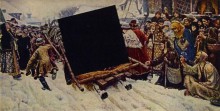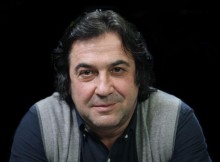The film Vagrich and the Black Square premiered at the recent film festival DOCUDAYS. UA. The picture was also screened at the forum beyond the competition. In my opinion, that was quite regrettable. Vagrich and the Black Square is the best film of the festival. On the other hand, it is pleasant: director Andrii Zahdansky is a former Kyivite, who lives in America, and this work is a co-production of Ukraine and the US. I think that it has a happy festival future.
Vagrich and the Black Square is a film about an artist. About his life and destiny. About the Soviet past of a person who was not Soviet by spirit, about emigration. About the fact that out of numerous possible versions of adaptation in the new world, Vagrich chose the only acceptable one – he didn’t change. The author says this at the beginning of the film, and I was grateful to him and the leading character for these words after the final credits. Because the film is a talented essay about freedom. In many senses. In particular, it is about freedom in Ukraine.
Vagrich and the Black Square is a funny and sad film. “Artist of the word,” “last futurist” (by expression of Andrei Sinyavsky) Vagrich Bakhchanyan, who is remembered by the middle and older generation due to his pictures, caricatures, and collages published in Literaturnaya gazeta, creates a surrealist world of his own. In this world, as it turns out, we still exist. “We were born to make Kafka reality,” “Take every means not to live in lies,” “Notorious KPRS,” Marriage Union of Soviet Socialist Republic,” “To preserve peace in a family, patience, love, understanding, and at least two TV sets are needed,” are all about us.
Vagrich and the Black Square is a very clear and incredibly complicated film. It has a clear idea and a polyphonic form. The director uses not only the traditional instruments of documentary cinema (footage of reports, interviews, and rare chronicles), but also screens the witty prose by Bakhchanyan with the help of animated plots, makes a theater production of Vagrich’s play The Seagull Petrel, which was the artist’s dream. In the review of the picture I want to mention Mandelstam’s quotation about the space compressed to a point which is used in the film. There is no accidental angle; the aesthetic construction will fall apart if you remove any of them.
“The artist asks questions, but does not give answers to them” is Vagrich Bakhchanyan’s favorite phrase. Andrii Zahdansky has the same opinion. With his work he said what he wanted to say. We can try to find our own answers to the questions that arise as you watch the film Vagrich and the Black Square. The director gave hints to some of them in an interview after the premiere of the film at DOCUDAYS.UA.
Andrii, many people in the audience, especially the youth, learned about Vagrich Bakhchanyan namely from the film Vagrich and the Black Square. Although you clearly told an artist’s life story, the picture cannot be called merely biographical. What is your definition of its genre?
“A collage film: documentary plus animation, video installations, and theater. I was looking for a genre which would be adequate for the leading character.”
You came up with the idea of the film (and even shot several episodes) very long ago, long before Vagrich died. Your circle in America (which includes bright, talented, unusual people) is quite wide. Why Bakhchanyan (I’m sure the reason is not only about your friendship)?
“My friendship with Vagrich was a late one. We didn’t know each other in our young years, in Kharkiv or Moscow periods. I learned about the Bakhchanyan’s youth when I started to make the film. Then his death put everything in perspective. Vagrich passed away. His works remained. Many works. I hadn’t seen most of them, before I ‘collected’ them in New York, New Jersey, Kharkiv, and Moscow. I was thinking about Bakhchanyan all the time. A lot and thoroughly. I even was thinking about a double title for the film – Vagrich and the Black Square, or the Meaning of Art. Vagrich was a genius. But apart from that he was a witty, attractive, warm, and kind person. I was happy to communicate with him, and I wanted to share him with the audience.”
Bakhchanyan’s paradoxical wit is stunning and amazing. Was he so witty in life?
“Vagrich didn’t like to perform a solo, he enjoyed a secondary role, which inevitably became the leading one.”
The title of the film Vagrich and the Black Square even before it was screened sent the audience to the well-known picture. The mystery and magic of Malevich’s Black Square has been a mystery for decades – every artist and art historian has an interpretation of their own. Bakhchanyan said in particular, “A square black as soot,” “A square black as bread,” “A square black as envy.” What does the space of the black square mean for you?
“The black square is the beginning and end of everything, as Vitaliy Patsyukov [Russian art historian. – Author] says in the film. This idea can be developed. The Soviet Union is the end of everything. The lack of talent is the end of everything. Death is the black square. Avant-garde is the beginning of art, black square is the embryo of art. Loneliness is also a black square, a thought is conceived when you are alone. Everything that is incompatible with life is a black square. Everything that is conceived is a black square. The big bang before the moment of the explosion is a black square. If you like, Russian television of Putin’s time is a black square because it is incompatible with life.”
During the shooting of the film Orange Winter several events happened you could not have foreseen (the opera Boris Godunov was shown before the presidential elections, La Traviata – on the day of Maidan’s victory). Later they influenced the dramaturgy of the film. In a sense they became its core. When you were working on the film about Vargich, a painting by a street artist Black Square near an entry to a Kharkiv house where Bakhchanyan resided in his youth was a similarly unexpected present, which immediately becomes a reason for contemplation. Can you explain these signs somehow?
“When you do something rightly, such findings and discoveries are inevitable. It is a bad sign when there are no such signs.”
The word freedom is repeated in the film many times with regard to Bakhchanyan and his creative work. Even Vagrich’s death is perceived as an act of creation and achieving of complete freedom. Did you become freer when you finished the long lasting and difficult work on the film?
“Yes. Every film, when you start to work on it, is a voluntary captivation. And every one brings freedom when you finish it. At least that’s what I have experienced before.”
One of the film’s characters considers that Bakhchanyan belongs to the generation of existential anxiety. In your opinion, are there any people with such a stand and philosophy these days?
“This is what Yevgeniy Barabanov [Russian art historian. – Author] says. I don’t know the answer. The question should be rather asked to people who are involved in the philosophy of contemporary art. Existentialism as such has not disappeared anywhere. Any thinking person has been ‘vaccinated’ with it forever. People still read Camus with excitement and anxiety. Both The Myth of Sisyphus and The Plague, which I started to reread on the day of the Russian annexation of Crimea.”
One of Vagrich Bakhchanyan’s catch phrases is: “My Fatherland makes me laugh.” What do you feel when you read or watch news from Ukraine?
“It is bad when you cannot find anything funny. Nothing connected with Ukraine is funny for me these days.”
What about America, where you have been living for more than 20 years?
“Of course. It makes me laugh all the time. Politicians are really helpful in this.”
What has been the brightest or the harshest impressions over recent years?
“Maidan.”
What is gratifying, amazing, or astonishing your today?
“My cat Ulysses. The films Ida by Pawel Pawlikowski, National Gallery by Fred Wiseman. Novels by Vladimir Sorokin. The play Shakespeare’s Sonnets by Robert Wilson. Columns of Aleksandr Genis and Yurii Rost. Facebook posts by Lev Rubinstein. The story by Tatyana Tolstaya Light Worlds. Recollections about the World War I Good-Bye to All That by Robert Graves. The Divine Comedy by Dante. This is today and recently. Tomorrow there will be something different. Always films by Luis Bunuel and short stories by Borges.”
By the way, about the cat. The Chinese say that a cat is a sneeze of a tiger. The name of Vagrich is translated from Armenian as a small tiger. On one of the photos in the film he (with his wife Iryna) is holding a cat. Was it just a little creature in the house, or Vagrich treated cats differently, like, for example, Aleksandr Genis or other people whom I really respect. Like Armen Dzhigarkhanyan, Sergei Yurski, Alla Demidova?
“Vagrich and Ira really loved their Siamese cat Kist-Batist, who came to New York from Moscow and lived a long happy life with them. He was a member of the family.”
What did Iryna Bakhchanyan say when she watched the film?
“She said the film was good, but very sad. But I don’t agree with the last assessment.”
Whether we want it or not, for some reason we always pick up from the people who are close and dear to us. What did you learn from Vagrich?
“Everything can be turned upside down. But later it turns out that you probably put everything like it should be.”
Do you see Vagrich in your dreams?
“I saw the film in my dreams when I was making it. But this is a usual thing.”
ANDRII ZAHDANSKY’S FILMOGRAPHY:
Registration (1988)
Interpretation of Dreams (1990)
Two (1992)
Six Days (2001)
Vasya (2002)
Konstantin and Mouse (2006)
Orange Winter (2007)
My Father Evgeni (2010)
Trottoirs de Paris (2013)
Vagrich and the Black Square (2014)
BOOKS BY VAGRICH BAKHCHANIAN:
Autobiography of a Forty-Year-Old Author (1981)
Visual diary 1/1/80 — 12/31/80 (1981)
Demarche of Enthusiasts (co-authored by Sergei Dovlatov and Naum Sagalovsky, 1985)
Signac under the Eye: Pointillaviv Poem (1986)
Nulla dies sine linea, Year’s End Report (1986)
Poems from Various Years (1986)
Eddy of Flies: Artricks (2003)
Cherry Hell and Other Plays (2005)
From Notebooks of Vagrich Bakhchanyan (2011)








